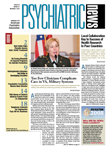The Senate has approved legislation to help prevent suicide among veterans returning from war and those long retired from military service.
The bill (HR 327), titled the Joshua Omvig Veterans Suicide Prevention Act, passed the Senate unanimously in September; the House passed its version in March.
The bill requires the VA to develop and implement a comprehensive program to reduce the incidence of suicide among veterans, including the availability of 24-hour mental health care for veterans thought to be at risk for suicide. It also calls for development of an outreach and education program for veterans and their families to help them recognize readjustment problems and promote good mental health.
In addition, the legislation would provide mandatory suicide prevention training for all VA personnel involved in medical care, including how to recognize the risk factors for suicide and the best practices for suicide prevention.
The legislation also would require that each VA medical facility designate suicide prevention counselors who would work with emergency rooms, police departments, mental health organizations, and veterans service organizations on outreach to veterans and improved coordination of veterans' mental health care.
The bill is named for Joshua Omvig, an Iraq War veteran who suffered from posttraumatic stress disorder and committed suicide in 2005.
The Senate bill included amendments to address objections raised by Sen. Tom Coburn (R-Okla.), who had placed a hold on the bill over provisions that would have allowed the Department of Veterans Affairs (VA) to track veterans who have been screened and identified as mental health risks through the bill's suicide prevention system. He derided the tracking provision as a violation of veterans' civil liberties and a danger to future job prospects.
“If, in fact, you have encountered the VA and because you were screened, not of your choice and not because you had signs or symptoms,. .that becomes a part of your record,” Coburn said in a written statement. “You automatically are limited in lots of things that you cannot do in this country.”
That provision and another that would have mandated a VA peer-counseling program—criticized by Coburn as ineffective—were removed by amendment. The VA can choose to offer the peer-counseling program but not mandate it.
Some of the provisions in the bill mirror initiatives undertaken administratively by the VA in recent years, including the placement of suicide prevention coordinators in every VA medical center and establishment of a veterans-focused, 24-hour, suicide prevention hotline.
APA had lobbied for a provision to require that all returnees receive a mental health screening instead of only a mental health status exam, which does little to detect mental illness or risk for suicide, said Lizbet Boroughs, deputy director of APA's Department of Government Relations. However, despite the limitations imposed by the Senate amendments, the bill's supporters recognize that overall the legislation offers tremendous benefits.
“This is bipartisan legislation that will help ensure that our veterans receive the mental health care that they need,” said Jerry Reed, executive director of the Suicide Prevention Action Network (SPAN USA), in a written statement. “Research shows us that male U.S. veterans are twice as likely to die by suicide than those without military service, making passage of the Joshua Omvig Veterans Suicide Prevention Act all the more critical.”
The legislation also aims to destigmatize mental health care. Many veterans have expressed fear about problems that might stem from their voicing concerns about their psychiatric problems, including whether receiving mental health care would damage future job prospects in the military or in civilian jobs, especially those related to law enforcement.
Veterans advocates have maintained that better coordination of health and criminal-justice services is needed to ensure that veterans with mental illness who have been released from local jails are referred to the VA system for help before they descend into homelessness or suicide.
Frederick Frese, Ph.D., a member of the NAMI board of directors, said at a September congressional briefing on veterans' mental health that coordination with local government agencies could keep many veterans with mental illness from going for years without treatment (see
Too Few Clinicians Complicate Care in VA, Military Systems).
Yet another part of the bill requires the VA to make outpatient mental health care for veterans considered at risk for suicide available on a 24-hour basis. Many veterans and their survivors have testified before congress about extended treatment waiting times they endured after reporting suicidal thoughts and requesting mental health care.
The bill also requires a toll-free hotline for veterans, staffed by“ appropriately trained mental health personnel” and available at all times, in addition to the 24-hour care requirement.
The measures are needed, said Sen. Tom Harkin (D-Iowa), sponsor of the Senate version, to reduce the more than 5,000 veteran suicides each year. The need is clear from statistics showing that the suicide rate for Iraq veterans is 35 percent higher than that for the general population, he said.
“This is a genuine crisis, and it requires an urgent, stepped-up response from the VA, which is exactly the purpose of my bill,” Harkin said.
The bill was endorsed by the American Legion, Veterans of Foreign Wars, Disabled Veterans of America, and other veterans groups.
“The American Legion receives contact from veterans themselves who openly admit they need immediate help because of thoughts of harming themselves,” said Shannon Middleton, deputy director for Health at the American Legion, in congressional testimony about the bill. “When the family and the veteran know what services are available, it is easier to seek assistance.”
The bill, after being amended in the Senate, was returned to the House in September for final passage.
The Joshua Omvig Veterans Suicide Prevention Act can be accessed at<http://thomas.loc.gov> by searching on the bill number, HR 327. ▪
